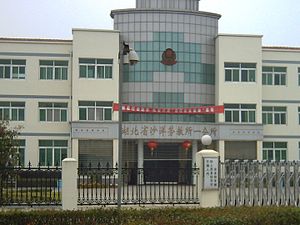
Back Reeducació mitjançant el treball Catalan Genopdragelse Danish Umerziehung durch Arbeit German Reeducación a través del trabajo Spanish اردوهای بازآموزی Persian Laojiao French Pendidikan ulang dengan menjadi buruh ID 労働教養 Japanese 노동교양 Korean Heropvoeding door werk Dutch

Re-education through labor (RTL; simplified Chinese: 劳动教养; traditional Chinese: 勞動教養; pinyin: láodòng jiàoyǎng), abbreviated laojiao (simplified Chinese: 劳教; traditional Chinese: 勞教; pinyin: láojiào) was a system of administrative detention on mainland China. Active from 1957 to 2013, the system was used to detain persons who were accused of committing minor crimes such as petty theft, prostitution, and trafficking of illegal drugs, as well as political dissidents, petitioners, and Falun Gong followers. It was separated from the much larger laogai system of prison labor camps.
Sentences under re-education through labor were typically for one to three years, with the possibility of an additional one-year extension. They were issued as a form of administrative punishment by police, rather than the judicial system. While they were incarcerated, detainees were frequently subjected to a form of political education. Estimates of the number of RTL detainees on any given year range from 190,000 to two million. In 2013, approximately 350 RTL camps were in operation.[1]
On 28 December 2013, the Standing Committee of the National People's Congress abolished the re-education through labor system and detainees were released.[2][3] However, human rights groups have claimed that other forms of extrajudicial detention have taken its place, with some former RTL camps being renamed drug rehabilitation centers.[4]
In 2014, re-education facilities were constructed in Xinjiang and they were used to target a wider context than people who were accused of committing minor crimes and political dissidence.[5] By 2017, these had become the massive Xinjiang internment camps holding 1–3 million people, utilizing forced labor, and now recognized as re-education camps by many nations, intergovernmental organizations such as the UN and EU, and human rights groups.[citation needed]
By October 2019, “students” held in these camps or “vocational education and training centers” were all released and these camps were closed. [6][7]
- ^ "Long overdue: The government says it will reform its system of labour camps". The Economist. 12 January 2013. Retrieved 8 November 2016.
- ^ 全国人民代表大会常务委员会关于废止有关劳动教养法律规定的决定 (in Chinese). 28 December 2013. Retrieved 26 May 2016.
- ^ Moore, Malcolm (9 January 2014). "China abolishes its labour camps and releases prisoners". The Telegraph. Retrieved 26 May 2016.
- ^ Amnesty International, "CHINA: “CHANGING THE SOUP BUT NOT THE MEDICINE?” : ABOLISHING RE-EDUCATION THROUGH LABOUR IN CHINA" (Dec 2013), p 35
- ^ "New Evidence for China's Political Re-Education Campaign in Xinjiang". uhrp.org. Retrieved 15 May 2018.
- ^ "新疆自治区主席、乌鲁木齐市委书记等在京答记者问" (in Chinese). 新京报客户端. 10 December 2019., “Chinese: 目前(2019年10月),参加“三学一去”的教培学员已全部结业,在政府帮助下实现了稳定就业,改善了生活质量,过上了幸福生活。”
- ^ "我大使答瑞媒17问:目前新疆没有一所教培中心" (in Chinese). 观察者网. 24 March 2021., “Chinese: 截至2019年10月,教培中心学员已经全部毕业。目前,新疆没有一所教培中心。过去四年多来新疆也未再发生一起暴恐事件。这一切都显示出,我们在新疆的政策是正确的。”
© MMXXIII Rich X Search. We shall prevail. All rights reserved. Rich X Search